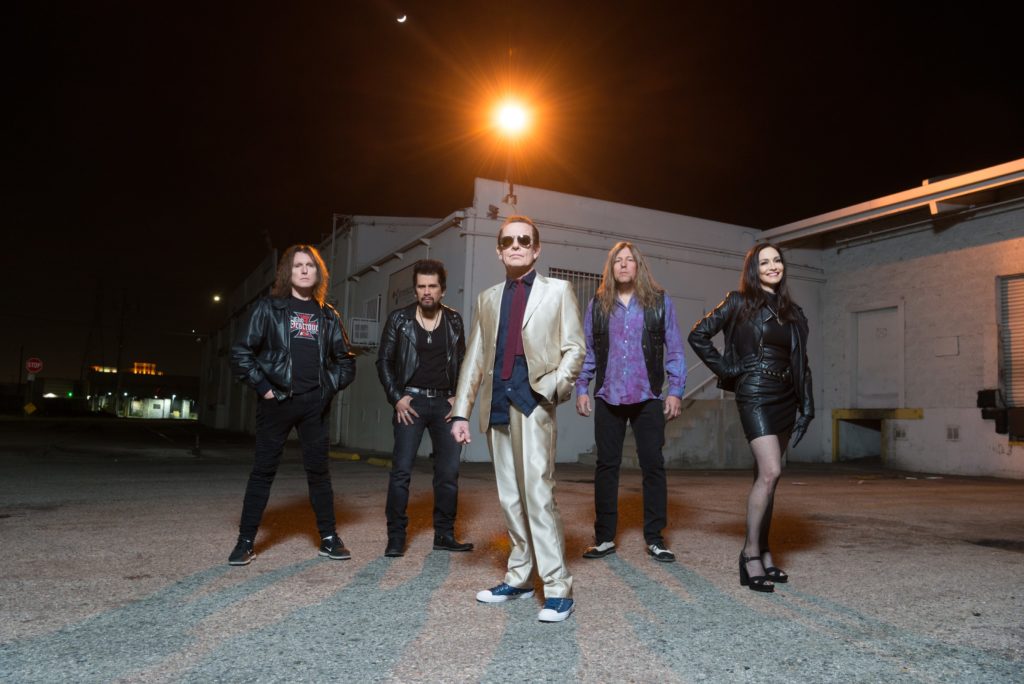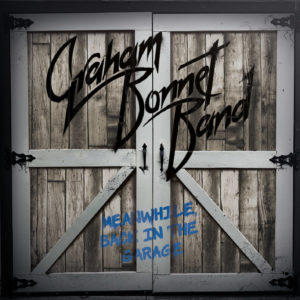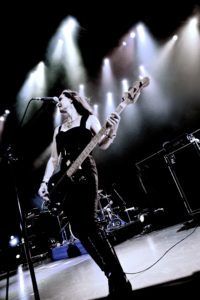
Possessor of one of the greatest set of vocal chords in rock music over the past 40 years, veteran British frontman Graham Bonnet is as prolific as he has ever been. A consistent concert draw internationally, he has parlayed his decades of experience and powerfully diverse and excellent musical pedigree into a career that sees him currently tour internationally in front of his own eponymous Graham Bonnet Band, as well as guesting on other artist’s albums and tours for years.
First coming to prominence as the vocalist who first replaced original singer Ronnie James Dio in Rainbow, he performed on that band’s most commercially successful album, Down to Earth, which spawned two radio classics, Since You’ve Been Gone and All Night Long, before leaving that band to work first with German guitar maestro Michael Schenker on his Assault Attack album, before beginning his own band, Alcatrazz, in the early 1980s. That band launched the careers of both Swedish six string god Yngwie Malmsteen, and his replacement, Steve Vai. He has also been member of the bands Impellitteri, Blackthorne and Elektric Zoo.
Over the years his powerful pipes have appeared on recordings by artists across the rock spectrum and around the world, as he is as popular and in demand in the Far East as he is throughout Europe. In 2014, he and his bassist girlfriend Beth-Ami Heavenstone began The Graham Bonnet Band, as a forum for the creation of new music, and as way to celebrate the music of his well-respected and diverse legacy or recordings. Early in the new band’s history, long-time Alcatrazz keyboardist Jimmy Waldo also joined the fold. The group released the critically and popularly acclaimed studio album The Book (which also featured a bonus CD of re-recordings of hits from that back catalogue), followed by Live … Here Comes the Night DVD/CD in 2017.
On July 13, The Graham Bonnet Band will issue a new collection of studio recordings, Meanwhile, Back in the Garage through Frontiers Music. The expanded version of the album also includes a DVD, Live at Daryl’s House, the popular club owned by Daryl Hall of Hall and Oates fame.
There is kind of a wry double meaning to the name of the new album, as it represents a nod to Bonnet’s past as a young hardscrabble musician back in his native England, as well as the way he creates his original music today.
“It’s kind of a joke going back to the early days when I used to rehearse in a garage when I was 14 years old or whatever with my band back home. And I had lots of different bands that I was in in England as a young man. We played the working man’s clubs and whatever social clubs we could in the small towns all over the country, mostly on the weekends. So, it kind of harkens back to those days,” he said.
“But at the same time, all the vocals for this record were done in the garage here at my home. So, Meanwhile, Back at the Garage is about me singing in a garage back when I was young and here I am back doing it again. Everything is here at home, so I don’t have to go anywhere. I go out to the garage, the microphone is put up, the computer is ready, and I just sing. I use the garage because it’s the safest and most sound-proofed place in the house. We actually put in stuff to sound proof it. Beth-Ami did her parts in the bedroom and the living rooms, so we used a lot of our house.
 “The drums were done in a proper recording studio, and so were a lot of the guitars, but those studios were within a couple of miles of each other and of my house. Jimmy Waldo our keyboard player was the producer and put it all together, so it’s very much a family affair so to speak. Everything for that phase was done out here and I helped Jimmy mix some things, mostly the vocals and harmonies, before he did the final mix. He put the whole thing together and he worked very, very hard and he was exhausted by the time it was over.”
“The drums were done in a proper recording studio, and so were a lot of the guitars, but those studios were within a couple of miles of each other and of my house. Jimmy Waldo our keyboard player was the producer and put it all together, so it’s very much a family affair so to speak. Everything for that phase was done out here and I helped Jimmy mix some things, mostly the vocals and harmonies, before he did the final mix. He put the whole thing together and he worked very, very hard and he was exhausted by the time it was over.”
One of the most powerful and poignant songs on the album is Sea of Trees, which is a real location in Japan near Mount Fuji where people go to commit suicide. It has been the subject of a number of documentaries and even though volunteers patrol the area to try and prevent people from killing themselves, they still come across those who have succeeded as well as some who may be having second thoughts. It is a relentlessly sad situation, and the sadness permeates the dense forest itself, giving it a maudlin and eerie stillness that haunts all who encounter it, or even hear of it – Bonnet included.
“It’s not a happy subject and it’s not a fun song, but it’s just reporting on what is an unbelievable story to me, that people do this. They go to this forest, which is absolutely dark because the tree canopy is so full that from the air it looks completely smooth, like a big blanket. So, it’s very dark with little streams of light like you see under the water. And when the wind blows, the leaves move like waves on the sea, so that’s why it’s called the Sea of Trees,” he explained.
“The people who are suicidal take ribbons and they tie one end of a spool of ribbon to a tree and take it right into the forest in case they change their mind and can follow the ribbon back out again. But the place has also become a morbid tourist attraction. It’s a place to go and see now. But there are also people who go in there all the time to check for bodies or to see if somebody is lost in there who may have changed their minds. I remember hearing about one time they went in and found all these pairs of shoes; two little pairs of children’s shoes and two pairs of adult shoes and the family all hung themselves from a tree. Part of the ritual aspect of the suicide, and it’s a Japanese thing, is they take off their shoes and leave them at the bottom of the tree. Why they do that I don’t know.
“Then there are other people who are found in a tent and were too scared to do what they came to do and changed their minds, but they couldn’t find their way out because the ribbon has been pulled from the tree or something.”
Those who got the initial version of the album will notice upon listening to the physical release and subsequent pressings of the vinyl, that the lyrics for Sea of Trees have been re-sung to reflect a more positive outcome and tone for the song. As Bonnet explains:
“At the beginning of the song it says take off your shoes, try to relax, it’s a beautiful day for dying. But at the end I now say, put on your shoes, it’s time to turn back, it’s a beautiful day for living. I think that’s a better way to end the song, a more positive way that says that people can turn around, and that they can get out while they can, and things can be better.”
Bonnet gets a little political (although not brow-beatingly overt) with the song America Where Have You Gone, which is his heartfelt protest of the willing inability of the powers that be to do anything to curb the blight of rampant gun violence.

“When I first moved out to L.A. back in 1979, it wasn’t like this. It wasn’t as bad where every morning you see something about police shooting down an innocent kid running away from gunfire, or everyday people being murdered in a mass shooting, or another school shooting, where someone goes in with a machine gun and mows down their classmates. It’s happening all the time, every day. There is such a problem with guns and nobody is doing anything about it,” he said.
“And it’s all about money. Guns are big business as we know, but as the songs says, until the guns are gone, the murder will go on. And it will. So, what are we going to about it? It looks like f*** all. And it angers me and that’s why I wrote the song. It pisses me off. I can’t believe we’re letting this go on.”
Meanwhile, Back in the Garage also features a stellar and unique cover of an unexpected song – the 1986 Tina Turner hit, We Don’t Need Another Hero, which was from the soundtrack of the third Mad Max film, Beyond Thunderdome, which starred Turner alongside the titular character, played by Mel Gibson.
“I saw the movie when it first came out and I was with Jimmy Waldo and Gary Shea from Alcatrazz. And when we walked into the parking garage it had this great reverb, so I started singing the chorus and they said, ‘wow, we should record that’ but then we immediately said nah, it wouldn’t fit with the band’s music,” Bonnet said.
“Many years later, at the beginning of this year actually or the end of last year, I was sitting with my manager in a restaurant in Sweden and we were just talking about songs and how I liked Tina Turner’s voice. And he suggested I cover We Don’t Need Another Hero with this band. I said okay, and we actually thought it would be great for the first single, because with Rainbow, Since You’ve Been Gone was a big hit and it was a cover [of Russ Ballard’s original]. It didn’t turn out to be a single because I think a few other songs on the album turned out better. But I do like it. And the people who have listened to it seem to like it as well.”
The core of The Graham Bonnet Band remains he, Waldo and Heavenstone. Drummer Mark Benequechea joined a handful of years ago, while the newest addition is veteran guitarist Kurt James (who only played on one track on the album but is now a permanent member of the group.)
“Mark is the best drummer ever. I love him, he is f***ing great. Jimmy Waldo and I have been together for years and we are like brothers in arms. Beth-Ami and I are the founding members of this. We put it all together four or five years ago. And now we have Kurt James who is an amazing guitar player. He can play everything that Yngwie Malmsteem did or Steve Vai did. He can also play country and western or reggae music – whatever. He is a real musician; a friggin’ great guitar player. When we finish shows, a lot of people want to go and talk to him because he is becoming a bit of a hero,” said Bonnet, who pointed out that being able to co-exist in a close-knit band environment is as important as musicianship or songwriting ability when it comes to adding or subtracting band members.
“When you live about nine or 10 hours in a van or a bus travelling from gig to gig, you sure find out who you want to kill and who you don’t want to kill. So far we’re all still living.”
Bonnet said he is hoping to get some dates in Canada for a couple of significant reasons. One is that its been a long while since he has played the Great White North, and he knows that there are lots of Rainbow, Alcatrazz and MSG fans who would love to hear those songs, as well as new material. But he also revealed that he has, literally, a long-lost son living in the Toronto area whom he has never met in person.

“It happened when I was a teenager and he was adopted after my girlfriend had the baby, but I didn’t even know she was pregnant. I found out not long ago that my son, who is now 50 years old, is living in Canada. So, I want to go up there and meet him, but we are finding it very hard because he is an engineer and is working all the time, and I am all over the place playing shows. Our schedules are always clashing,” he said.
“But I keep in touch with him, and I know that I also have a grandson who is 14 and he is a guitar player and from what I have heard he is pretty incredible. I found out about my son when I came home from a tour and there was a letter in my mailbox and it was from him, he just found me through the Yellow Pages I guess. I had been looking for him for about 16 years and I couldn’t find him, but he found me, which is incredible. It’s gonna be the weirdest but also the happiest day when I actually meet him and be able to say, ‘hello son.’”
In the interim, Bonnet will be doing more shows with the Michael Schenker Fest reunion project over in Russia, and then the Graham Bonnet band will jet back over to Europe for shows in Spain, Germany, Ireland and the U.K.
For tour dates and information about Meanwhile, Back in the Garage, visit http://www.grahambonnetband.com.
- Jim Barber is a veteran award-winning journalist and author based in Napanee, ON, who has been writing about music and musicians for a quarter of a century. Besides his journalistic endeavours, he now works as a communications and marketing specialist. Contact him at jimbarberwritingservices@gmail.com.
SHARE THIS POST:
